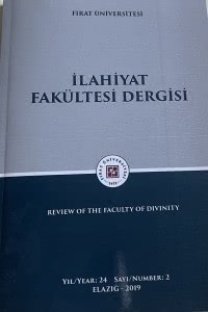NE UMABİLİRİM? KANT’IN AHLAK FELSEFESİNDE UMUT KAVRAMI
Umut, Kant ahlakı, en yüksek iyi, umut felsefesi, rasyonel özne
What may I hope? The Concept of Hope in Kant’s Moral Philosophy
Hope, Kant’s morality, the highest good, philosophy of hope, rational subject,
___
- Aristoteles, 1995, Retorik, (Çev: Mehmet H. Doğan), İstanbul: Yapı Kredi Yayınları.
- Beck, Lewis White,1966, A Commentary on Kant’s Critique of Practical Reason, Chicago: University of Chicago Press.
- Caygill, Howard, 1996, A Kant Dictonary, Oxford: Blackwell.
- Çilingir, Lokman, 2005, Pratik Aklın Doğal Diyalektiği, Ankara: Elis.
- Gardner, Sebastian, 2006 “The Primacy of Practical Reason”, A Companion to Kant, Malden: Blacwell Publishing: 259-255.
- Kant, Immanuel: Kant eserleri için Kant’s Gesammelte Schriften, Berlin: Georg Reimer, Walter de Gruyter & Co., 1900–) standart baskının cilt ve sayfa numaraları esas alınmıştır. Critique of Pure Reason için B baskısı esas alınmıştır.
- 1785: Groundwork of The Metaphysics of Morals
- 1787: Critique of Pure Reason B
- 1788: Critique of Practical Reason
- 1790: Critique of Judgement
- 1793: Religion Within The Boundaries of Mere Reason
- 1797: Metaphysical of Morals
- 1817: Lectures on The Philosophical Doctrine of Religion
- Peters, Curtis H., 1993, Kant’s Philosophy of Hope, New York: Peter Lang.
- Plato, 1975, Philebus, (Çev: J. C. B. Gosling), Oxford: Clarendon Press.
- Plato, 2008, Timaeus, Timaeus and Critias, (Çev: Robin Waterfıeld, Oxford: Oxford University Press içinde.
- Tan, Necmettin, 2002, Paul Tillich’te Vahiy ve İman, yayınlanmamış YL Tezi.
- O’neill, Onora 1996, “Kant on Reason and Religion”, The Tanner Lectures On Human Values, http://tannerlectures.utah.edu/_documents/a-to-z/o/oneill97.pdf. 12.12.2013.
- Tıllıch, Paul, 1969, The Courage to be, New Haven: Yale University Press.
- Webb, Clement C. J., 1926, Kant’s Philosophy of Religion, London: Oxford University Press.
- Wolterstorff, Nicholas, P., 2011/1, “Kant’ın Akıl Dinindeki Muammalar”, (Çev: Necmettin TAN), Sakarya Üniversitesi İlahiyat Fakültesi Dergisi, XIII, 23.
- Wood, Allen W., 1970, Kant’s Moral Religion, Ithaca and London: Cornell University Press.
- --------------------1978, Kants Rational Theology, Ithaca and London: Cornell University Press.
- ISSN: 1304-639X
- Yayın Aralığı: 2
- Başlangıç: 1996
- Yayıncı: FIRAT ÜNİVERSİTESİ İLAHİYAT FAKÜLTESİ
MEDENİYETLERİN RUHU VE OSMANLI MEDENİYETİ
İSLAM MEZHEPLERİNDE BİAT ALGISININ OLUŞUM SÜRECİ
BİR HADÎSÇİ OLARAK SUYÛTÎ’NİN BAZI HABERÎ SIFATLARA YAKLAŞIMI -et-Tevşîh Adlı Eseri Bağlamında-
WHİTEHEAD’DE METAFİZİK VEYA SPEKÜLATİF FELSEFE
WHİTEHEAD’DE TANRI’NIN YARATICILIĞI PROBLEMİ
HACI MUHARREM HİLMİ EFENDİ DİVANINDA NEFS KAVRAMI HAKKINDAKİ GÖRÜŞLERİ
HACI MUHARREM HİLMİ EFENDİ DİVANINDA TEVBE KAVRAMI HAKKINDAKİ GÖRÜŞLERİ
